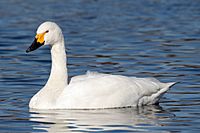Derwent Ings facts for kids
| Site of Special Scientific Interest | |

Adult Bewick's swan (Cygnus columbianus bewickii)
|
|
| Area of Search | East Riding of Yorkshire, North Yorkshire |
|---|---|
| Coordinates | 53°54′40″N 0°55′50″W / 53.911236°N 0.930547°W |
| Interest | Biological |
| Area | 1,636.91 acres (6.6243 km2; 2.55767 sq mi) |
| Notification | 1975 |
Derwent Ings is a very special natural area in England. It is located between Sutton upon Derwent and Menthorpe, right next to the River Derwent. This important place is shared between North Yorkshire and the East Riding of Yorkshire.
It was officially recognized as a special site in 1975. Part of Derwent Ings is looked after by the Yorkshire Wildlife Trust and English Nature. They work together to protect this amazing natural habitat.
Contents
What Makes Derwent Ings Special?
Derwent Ings is known around the world for its natural beauty and importance. It has several special titles that show just how valuable it is.
A Site of Special Scientific Interest
First, it is a Site of Special Scientific Interest (SSSI). This means it is one of the best places in the UK for wildlife and geology. The government protects these areas to make sure their special features are safe.
A Wetland of International Importance
Derwent Ings is also recognized as a Wetland of International Importance under the Ramsar Convention. This is an international agreement that helps protect wetlands around the world. Wetlands are areas like marshes, fens, and floodplains that are covered by water for at least part of the year. They are super important for many plants and animals.
A Special Protection Area
Finally, it is a Special Protection Area. This title comes from a European agreement to protect wild birds and their habitats. It means Derwent Ings is a crucial place for many bird species, especially those that are rare or in danger.
A Unique Habitat
The site is made up of different types of natural areas. You can find neutral alluvial flood meadows, which are grasslands that flood when the river overflows. There are also fen and swamp communities, which are wet, marshy areas. Plus, it has freshwater habitats like ponds and streams.
This mix of habitats makes Derwent Ings one of the most important examples of its kind in the UK. The flood meadows here are very natural and have not been changed by farming. This means they are full of many different kinds of plants and animals.
A Home for Birds
Derwent Ings is a fantastic place for birds, especially in winter. During the colder months, more than 20,000 waterfowl gather here. Waterfowl are birds like ducks, geese, and swans that live near water.
Many different bird species can be seen at Derwent Ings. You might spot large numbers of Bewick's swan, which are beautiful white swans. Other common birds include teal, wigeon, mallard, and pochard. You can also see wading birds like the golden plover and the ruff. These birds come to Derwent Ings because it offers them a safe place to feed and rest during the winter.
 | Madam C. J. Walker |
 | Janet Emerson Bashen |
 | Annie Turnbo Malone |
 | Maggie L. Walker |

